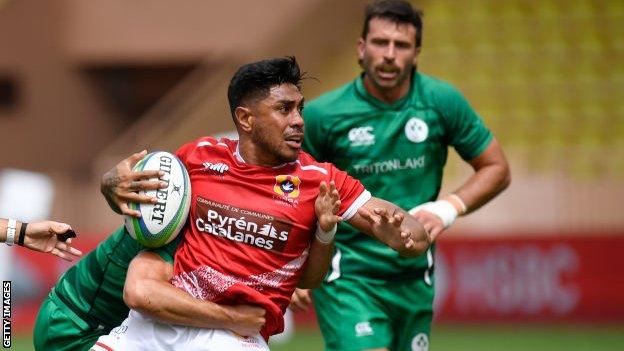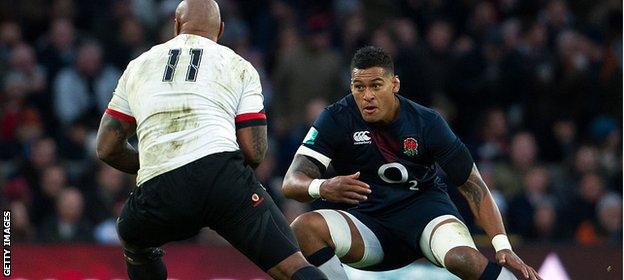World Rugby to vote on easing rules on player Test team switches
- Published
- comments

Malakai Fekitoa, who played for New Zealand in the 2017 Test series against the British and Irish Lions, qualified for Tonga after playing Olympic Sevens qualifying in the summer
International players will be able to switch nationality if revolutionary changes to eligibility rules are voted through by World Rugby later this month.
Under the new proposals, players will be able to represent the country of their or their ancestors' birth after a three-year stand-down period.
The likes of All Blacks superstar Charles Piutau could represent Tonga as soon as next year in what would be a major boost to Pacific Island nations before the 2023 Rugby World Cup.
The World Rugby council will discuss the proposals at the next meeting on 24 November, with a 75% majority, or 39 of 52 votes, required for the ruling to pass.
What are the current rules?
Under the current rules, a player is "captured" once they have won a senior cap - a nation's 2nd XV and sevens team can also capture players, external - and are thereafter tied to that country and unable to play for another nation.
Rugby sevens' inclusion in the Olympic Games from 2016 has provided an eligibility loophole, with former All Blacks centre Malakai Fekitoa an example of a player who has successfully switched nationality after representing Tonga in Olympic qualifying events.
Fekitoa, who won 24 New Zealand caps between 2014 and 2017 and played against the British and Irish Lions, became eligible for the country of his birth earlier this year. He would be playing for Tonga against England on Saturday were it not for injury.
However, securing release from club employers has proved difficult for other players, while the prospect of playing sevens is weighted towards backs as opposed to tight-five forwards - the locks, hooker and props who are normally the biggest and heaviest players on the team.
What is being proposed?
Under the new plans, a player would be eligible for a nationality switch once they have not played international rugby for three years.
If they then have a "close and credible link" to another country - through birth or the birthplace of parents or grandparents - then they would be able to change nationality. Players would only be able to switch once in their careers.
In theory, it means players like Mako and Billy Vunipola would be eligible to play for Tonga, through their father, if they aren't capped by England between now and 2024, although Billy Vunipola last year ruled this prospect out. , external

Nathan Hughes, right, made his second England appearance against Fiji, the land of his birth, in 2016
The Fijian-born Bristol number eight Nathan Hughes, who won the last of his 22 England caps in 2019, would then be able to switch to his home country in 2022.
While the changes are likely to be supported by the Pacific Island countries, especially given the high proportion of players with Pacific Island ancestry representing other nations, there are concerns about the unintended consequence of allowing players to switch, as well as fears it could discriminate against other Tier Two countries who base their systems on home-grown players.
World Rugby has already extended the residency qualification period from three years to five years, with this ruling set to take effect from 31 December 2021.

MATCH OF THE DAY WALES: The latest Welsh footie with Jason Mohammad
SCRUM V PODCAST: The latest rugby news and views
